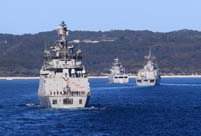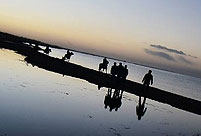The tourist city Montego Bay on the northwest coast of Jamaica has attracted hundreds of scientists and government representatives with the 2nd Global Conference on Land-Ocean Connections (GLOC-2).
The ongoing three-day conference, which started Wednesday, is hosted by the United Nations Environment Programme (UNEP) to identify ways of addressing current and emerging issues in the marine and coastal sector, with a focus on marine litter, nutrients and wastewater.
These particular issues were named as priorities for the Global Programme of Action for the Protection of the Marine Environment from Land-based Activities (GPA) for 2012-2016 in its Manila Declaration.
Under the declaration, signatories reaffirmed their commitment to develop policies to reduce and control wastewater, marine litter and pollution from fertilizers with a total of 16 provisions focusing on actions between 2012 and 2016.
The ongoing GLOC-2, according to UNEP, is supposed to provide a platform for stakeholders to probe consensus on protection of the marine environment from land-based activities through the implementation of GPA.
However, during the media workshop alongside the conference, scientists and government representatives still seemed far from the expected consensus.
Up to 90 percent of wastewater in developing countries flows untreated into rivers, lakes and highly productive coastal zones, threatening health, food security and access to safe drinking and bathing water.
Over half of the world's hospital beds are filled with people suffering from water-related diseases, while some 2.2 million people die each year from diarrhoeal conditions: 1.8 million of those are children under 5 years old.
The cumulative impacts of excessive, illegal or unregulated wastewater discharges particularly affect coastal areas, since these contain some of the world's most productive yet fragile ecosystems such as mangroves, seagrass beds and salt marshes, on which the Small Island Developing States (SIDS) in particular often depend.
Half of the world's food security depends on the use of nitrogen and phosphorous in fertilizer to grow crops, resulting in some agricultural activities spilling too much into the environment with profound impact - ranging from pollution of water supplies to undermining ecosystems.
Some 20 million tons of phosphorous are mined every year and nearly half of it enters oceans - eight times the natural rate of input. It contributes to the rapid growth of de-oxygenated dead zones in the world's seas and oceans.
UNEP's recent report noted that an estimated 245,000 square km of marine ecosystems are affected by hypoxia, impacting on fisheries, livelihoods and the food chain.
The climate is also affected. Wastewater-related emissions of methane and nitrous oxide, both powerful global warming gases, could rise by 50 percent and 25 percent respectively between 1990 and 2020.
As for marine litter, according to UNEP, there is no recent and certain figures on the amount of marine litter worldwide. Nor are there any such global figures on the annual input of litter to the marine and coastal environment.
In 1997, the United States Academy of Sciences estimated the total input of marine litter into oceans worldwide at approximately 6.4 million tonnes per year. According to other calculations, some 8 million items of marine litter have been estimated to enter oceans and seas everyday, about 5 million of which are thrown overboard or lost from ships.
Based on these figures, scientists insist it should be governments' priority to make substantial efforts to protect the environment, though some government representatives seem to be wary of supporting the suggestion.
"If you have a Jamaican who does not have a job, it can be a greater threat to the environment than anything else," said Ian Hayles, Minister of State in the Ministry of Water, Land, Environment and Climate Change of Jamaica.
"The government's priority is very straightforward wherever it will create a climate here to attract all investments in Jamaica," he added.
Jamaica is now challenged with environment protection issues as well as a sluggish economy.
With a decline of 0.1 percent in 2012 and a lukewarm projected growth of 0.1 percent in 2013, it ranks as the slowest growth in Latin America and the Caribbean.
Meanwhile, the government's recent efforts to bring in investment to build a global logistic hub in Goat Island, located in the country's protected area, has backfired.
On the road to finding a balance between protection of the environment and economic development, the island nation sinks into a dilemma.
Balance is important, as is admitted by Hayles. However, where the balance is and how to get it might be most important questions to be broached.
 Police officer injured after gunshots outside Capitol
Police officer injured after gunshots outside Capitol 11 countries' warships arrive at Jervis Bay for security exercise
11 countries' warships arrive at Jervis Bay for security exercise Chinese tycoon aims to restore London's Crystal Palace
Chinese tycoon aims to restore London's Crystal Palace A staple of southern Chinese people
A staple of southern Chinese people Portrait of an amateur Waltz dancer
Portrait of an amateur Waltz dancer Tourists take pictures beside Qinghai Lake in Xining
Tourists take pictures beside Qinghai Lake in Xining Travel with photographer- Gansu province
Travel with photographer- Gansu province  Serena Williams stumbles through to quarterfinals
Serena Williams stumbles through to quarterfinals Thailand Mobile Expo 2013 kicks off
Thailand Mobile Expo 2013 kicks off Photo collection of Chinese Navy
Photo collection of Chinese Navy People mourn for victims of mall attack
People mourn for victims of mall attack Twins Culture Festival kicks off in Beijing
Twins Culture Festival kicks off in Beijing UNESCO world heritage site: Montale Tower
UNESCO world heritage site: Montale Tower Li Na vs Novak Djokovic in charity match before 2013 China Open
Li Na vs Novak Djokovic in charity match before 2013 China Open American batman soars through China's Jianglang Mountain
American batman soars through China's Jianglang MountainDay|Week|Month